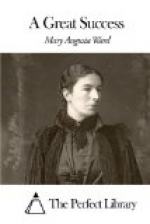As for Uncle Charles, he had simply declined all responsibility in the matter. He had never seen the Dunstables, wouldn’t know them from Adam, and had no concern whatever in what happened to their son. The situation merely excited in him one man’s natural amusement at the folly of another. The boy was more than of age. Really he and his mother must look after themselves. To meddle with the young man’s love affairs, simply because he happened to visit your studio in the company of a lady, would be outrageous. So the painter laughed, shook his head, and went back to his picture. Then Miss Wigram, looking despondently from the silent Doris to the artist at work, had said with sudden energy, “I must find out about her! I’m—I’m sure she’s a horrid woman! Can you tell me, sir”—she addressed Bentley—“the name of the gentleman who was painting her before she came here?”
Bentley had hummed and hawed a little, twisting his red moustache, and finally had given the name and address; whereupon Miss Wigram had gathered up her papers, some of which had drifted to the floor between her table and Doris’s easel, and had taken an immediate departure, a couple of hours before her usual time, throwing, as she left the studio, a wistful and rather puzzled look at Mrs. Meadows.
Doris congratulated herself that she had kept her own counsel on the subject of the Dunstables, both with Uncle Charles and Miss Wigram. Neither of them had guessed that she had any personal acquaintance with them. She tried now to put the matter out of her thoughts. Jane brought in a tray for her mistress, and Doris supped meagrely in Arthur’s deserted study, thinking, as the sunset light came in across the dusty street, of that flame and splendour which such weather must be kindling on the moors, of the blue and purple distances, the glens of rocky mountains hung in air, “the gleam, the shadow, and the peace supreme”! She remembered how on their September honeymoon they had wandered in Ross-shire, how the whole land was dyed crimson by the heather, and how impossible it was to persuade Arthur to walk discreetly rather than, like any cockney tripper, with his arm round his sweetheart. Scotland had not been far behind the Garden of Eden under those circumstances. But Arthur was now pursuing the higher, the intellectual joys.
She finished her supper, and then sat down to write to her husband. Was she going to tell him anything about the incident of the afternoon? Why should she? Why should she give him the chance of becoming more than ever Lady Dunstable’s friend—pegging out an eternal claim upon her gratitude?
Doris wrote her letter. She described the progress of the spring cleaning; she reported that her sixth illustration was well forward, and that Uncle Charles was wrestling with another historical picture, a machine neither better nor worse than all the others. She thought that after all Jane would soon give warning; and she, Doris, had spent three pounds in petty cash since he went away; how, she could not remember, but it was all in her account book.




